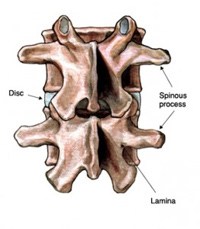Posterior Spinal Fusion
In posterior spinal fusion your neurosurgeon adds bone graft at the back of your spine during surgery to fuse two or more vertebrae together. The word posterior also refers to the surgical approach, where the skin incision is made; the rear or back of the spine.

Posterior spine
Spinal fusion
Spinal fusion uses bone graft to stimulate bone to heal together-to fuse solid. Bone graft is packed into empty spaces between the vertebral bodies and around instrumentation (if added). As your spine heals, the bone graft stimulates your bone to make new bone and with time, joins bones together.
| Bone graft type |
What it is |
| Autograft |
Bone from your body |
| Allograft |
Donor bone |
| Biologics |
Made from proteins |
Purpose of spinal instrumentation
Instrumentation immediately stabilizes the spine. It is a general term that refers to spinal implants. Spinal implants and devices that may be posteriorly implanted or affixed to the back of the spine include interspinous devices, AxiaLIF, plates, rods, screws, wires, and hooks. Implants are made from materials such as stainless steel or titanium alloy.
Posterior spinal fusion procedures
There are many types of posterior spinal fusion procedures. Several are listed below.
- Posterior Lumbar Interbody Fusion (PLIF)
- AxiaLIF
- Posterior Cervical Laminectomy and Fusion
- Minimally Invasive Spine Surgery
Another surgical approach is Direct Lateral Interbody Fusion (DLIF). The procedure involves small skin incision(s) at the side of the spine. DLIF is a less invasive surgical approach that avoids cutting through muscles and soft tissues. During a DLIF approach, your neurosurgeon can access the spine through the psoas muscle (at the side of your low back).
Help make your posterior (or direct lateral) fusion a success
The success of your posterior (or direct lateral) fusion procedure depends on your body’s ability to heal and make new bone. The neurosurgeon considers your general health, including co-existing disease that may challenge healing. Such disorders include diabetes, endocrine disease, and osteoporosis. He may order specific tests before your surgery.Although you may have a co-existing health problem, there are steps you can take under your neurosurgeon’s direction that may help lower your risk for failed fusion.
- Stop smoking; don’t use tobacco. If you smoke, your neurosurgeon may require you to start a smoking-cessation plan well in advance of your spine surgery.
- Feed your body to fuel it for healing. Getting your body ready for surgery is as important as eating well during recovery and for future spine health.
- Exercise per your neurosurgeon’s instructions. Movement speeds up your circulation and oxygen intake. This is important to healing. How? Circulation of blood and lymph are essential to feed your body and remove waste at the cellular level.
- After spinal fusion surgery, get plenty of rest. Your body will fatigue easily, especially in the early days and weeks during recovery.
Talk with your neurosurgeon
We hope this information about posterior spinal fusion has answered your immediate questions. Remember, your neurosurgeon is your most valuable source to answer your questions about symptoms, treatment and your healthcare.
Learn more about posterior spinal fusion surgery from these online sources:
|






